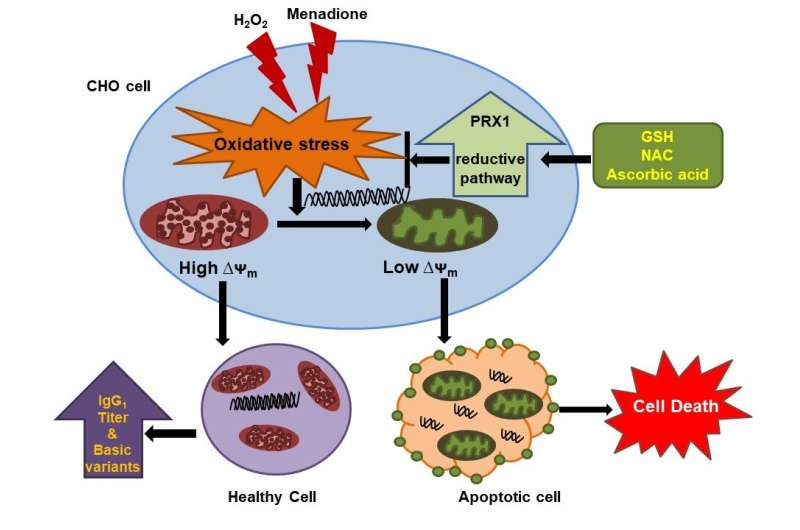Addition of antioxidants to cell cultures can enhance the production of monoclonal antibodies

Researchers at the Department of Chemical Engineering, Indian Institute of Technology, India, have investigated the effects of oxidative stress on the production of monoclonal antibodies (mAbs), and how antioxidants can alleviate this stress to improve their performance.
mAbs are a type of antibody produced in the lab to target specific proteins involved in harmful processes in the body (for example, antigens on the surface of cancer cells). They activate the body’s immune system to attack the specific target, in the same way antibodies produced by the body identify and counteract invading pathogens.
Researcher Professor Anurag Rathore explained, “The significantly high half-life (due to their size), relatively few side effects, and incredible specificity have contributed to the popularity of mAbs.”
mAbs are increasingly used in therapies for a variety of cancers and autoimmune diseases, among other conditions. Because of this high demand, it is necessary to optimize protein expression in cell cultures for efficient production of antibodies.
In this paper, published in the Journal of Chemical Technology and Biotechnology on February 7, the detrimental effects of reactive oxygen species (ROS) generated in cells under enhanced protein expression conditions are delineated, showing that high oxidative stress caused by a build-up of ROS affects the cellular machinery, reducing cell viability.
Prof Rathore explains, “ROS triggers alterations in allosteric sites within enzymes and proteins by oxidizing the thiolate anion to sulfenic form thus altering their function. If not dealt with, this can have significant implications for the process and the product.”
The study explores the effects of antioxidative ROS scavengers on cell cultures, specifically with regards to the regulation of mitochondrial membrane potential, ROS generation and apoptosis (a type of cell death), as well as the impact on antibody production and quality.
The researchers found that in Chinese hamster ovary (CHO) cells expressing a recombinant antibody igG1, the addition of antioxidative ROS scavengers such as glutathione, N-acetylcysteine (NAC) and ascorbic acid to cell cultures rescued cells from damage caused by oxidative stress and DNA fragmentation during the production phase.
There was a 52% decrease in ROS levels, a 69% decrease in apoptosis (a type of cell death), and a 38% enhancement in antibody production. Conversely, treatment with oxidants resulted in decreased antibody production by 47% and an increase in acidic species by 18%.
The authors conclude that media supplementation with a combination of antioxidants during the antibody production phase in cell cultures can therefore enhance antibody production. At present, the effects of ROS are not monitored in industry, and Prof Rathore notes that an analysis of how oxidative stress impacts antibody production on a product-by-product basis would be useful, to identify where supplementation with antioxidants would be of benefit:
“The impact of ROS on productivity and product quality is likely to vary from product to product; for cases where this is an issue, appropriate consideration would help.”
While this paper has laid clear the potential benefits of alleviating oxidative stress to enhance antibody production, further research is required before commercial implementation. This includes an assessment of the impact on process economics and “a detailed examination into the metabolomics of the cells when antioxidants are added,” notes Prof Rathore.
More information:
Rajinder Kaur et al, Role of oxidative stress in modulating CHO cell culture performance: Impact on titer and quality attributes of a monoclonal antibody therapeutic, Journal of Chemical Technology and Biotechnology (2022). DOI: 10.1002/jctb.7280
Provided by
Society of Chemical Industry
Citation:
Addition of antioxidants to cell cultures can enhance the production of monoclonal antibodies (2023, February 15)
retrieved 15 February 2023
from https://phys.org/news/2023-02-addition-antioxidants-cell-cultures-production.html
This document is subject to copyright. Apart from any fair dealing for the purpose of private study or research, no
part may be reproduced without the written permission. The content is provided for information purposes only.
For all the latest Science News Click Here
For the latest news and updates, follow us on Google News.

